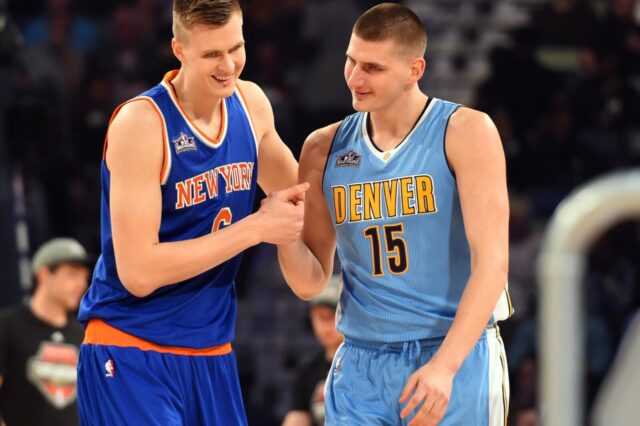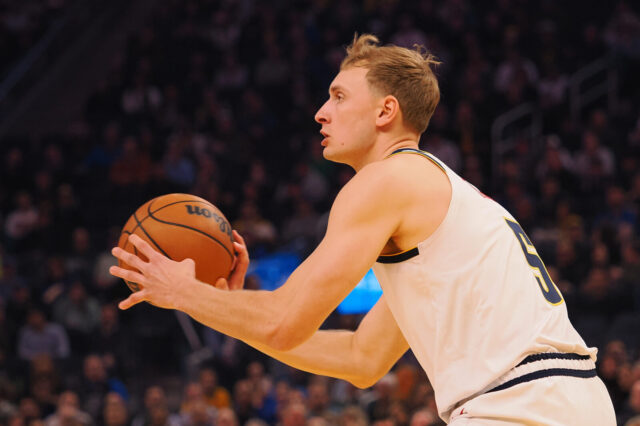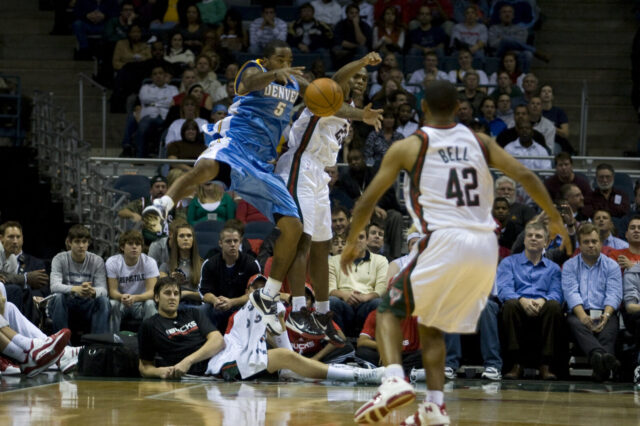A team with a lot of talent is good. A team with well distributed talent can be great.
I think it’s safe to say that the Denver Nuggets are a better team than the Cleveland Cavaliers. They are certainly a more talented team than some of the franchises that made the Western Conference playoffs: the Portland Trail Blazers come to mind, as do the New Orleans Pelicans and the Minnesota Timberwolves.
So, why is it that the Nuggets are still sitting at home, while three of those four franchises remain in playoff contention?
Mismanagement.
No, this isn’t just a shot at the Nuggets’ front office and/or coaching staff. On the contrary, the Nuggets have done a good job of assembling a talented roster. Usually, talent wins out over most any scheme because in the playoffs, players that weren’t focused on defense suddenly become more attentive. Also, coaching staffs get to sift through the video, data, and experience of a series to make corrections on the fly, negating most coaching disadvantages or eliminating those who can’t hang.
What I’m talking about is the distribution of talent throughout the roster, and a fundamental difference between Tim Connelly and Michael Malone that negates the advantages of each man’s strategic thinking.
Tim Connelly’s philosophy in assembling a roster revolves around the acquisition of talent, maximizing the amount of talent of the 15 (now 17) roster slots afforded. Connelly was on the Woj Pod with Adrian Wojnarowski back in October of last year, and when asked about Denver’s depth and challenges in finding playing time, Connelly was adamant about his strategy.
“We’re fortunate that a lot of the guys we’ve picked, the coaches have done a great job developing them, and we have a locker room full of guys that can play rotation minutes. Certainly, that’s not going to be the case. You can’t play all 15 guys, now all 17 guys…it’s going to be a challenge. I think we want guys that are certainly capable of producing and unhappy when they aren’t playing, but we also want guys to know that professionalism has to be put in front of everything, and we have pretty high and lofty expectations this year.” – Tim Connelly, Woj Pod
Save for Richard Jefferson and Darrell Arthur, both of which were contributors the previous year, it’s reasonable to think that each player on the roster could have maintained a role in the regular rotation.
- Nikola Jokic was the primary starter at center, but Mason Plumlee is a solid backup.
- Paul Millsap was the primary starter at power forward, but Trey Lyles and Juancho Hernangomez were solid backups with more potential than that. Kenneth Faried was a starter the previous year, and he had potential to continue being effective in a smaller role. Tyler Lydon is a stretch, but so is every rookie, and they have to learn at some point.
- Wilson Chandler was the primary starter at small forward, but Torrey Craig proved to be competent throughout the year.
- Gary Harris was the primary starter at center, but Will Barton could have served that role as the starter too, and Malik Beasley, in the right scenario, could have been the backup.
- Jamal Murray was the starter, and while Emmanuel Mudiay failed as the backup, Devin Harris filled it adequately, and Monte Morris may have been able to as well.
The starting unit in Denver was excellent throughout the season, as the five-man unit of Murray, Harris, Chandler, Millsap, and Jokic was the 9th best lineup in the NBA with a minimum of 300 minutes, posting a +9.8 Net Rating. The variations of that lineup with Will Barton were also excellent. Replace Barton for Harris? +6.9 Net Rating. Replace Barton for Chandler? +32.7 Net Rating. Replace Barton for Millsap? +2.5 Net Rating. Replace Barton for Murray? +5.6 Net Rating.
*Replacing Barton for Jokic yields a -47.2 Net Rating, though it only saw the floor for 10 minutes. Still, my eyes!
The top six players in the rotation really weren’t the problem. Chandler struggled at times, but he was the fifth option offensively. These were the players that were supposed to take Denver to the playoffs, and they nearly did.
The problem became options 7 through 17, especially after Millsap went down.
In a nutshell, things shouldn’t have spiraled as they did. Replace Millsap in the rotation with Trey Lyles, and Denver’s Net Rating stays at a +9.2. The problem? Michael Malone’s philosophy flew in the face of Tim Connelly’s.
While Connelly looked to acquire as many talented players as possible, I suspect that Malone knew who most of the guys were that he would regularly play in his rotation: the outstanding first round talent in Murray, his preferred wings in Harris, Barton, and Chandler, his new All-Star in Millsap, and his two centers in Jokic and Plumlee.
Back before training camp in September, Malone cited a nine-man rotation as the optimal setup.
What Malone didn’t know was where the rest of the contributions would come from. He figured one of Jameer Nelson or Emmanuel Mudiay would step into the backup PG role but didn’t know how things would work out. He probably had an idea of who to play at a backup forward position between Lyles, Hernangomez, and Faried. In the end, the team began the year with Mudiay and Faried in the rotation, and neither of those decisions worked out.
Plumlee performed like an average 7th man in a rotation this year, but his minutes count was closer to an 8th or 9th man, partially because he backed up Jokic, but also because the lineups with him on the floor were mostly ineffective. Denver had a “what do we do without Nikola Jokic on the floor” problem, and while that’s not all on Plumlee, he shares the blame with the coaching staff and the front office.
Denver had 10 five-man lineups that played 50 minutes together this season. Eight of them included Jokic. The other two included Murray, Harris, and Barton. Nine included Harris. The other one was the starters plus Barton. This isn’t a positive thing. It speaks to Denver’s inability to craft sustainable lineups without their best players on the floor.
It also speaks to Malone’s distrust of his fringe rotation players. As talented as they are, only Trey Lyles saw the floor with relative consistency, and that was because Millsap was out for 44 straight games. And it wasn’t like Lyles really struggled while he was out there. This season, he finished with 9.9 points and 4.8 rebounds on 19.1 minutes per game, posting a 59.0 TS%. Among bench forwards in the NBA, that TS% ranked 9th. Ninth!
In the last game of the season, Lyles played zero minutes. Plumlee was -14 in just 12 minutes. That was the difference in an over time game.
Other players barely saw the court as well. Torrey Craig had a reasonable excuse, being that he was on a two-way contract. Still, he had the same effective field goal percentage as Chandler this season. As Chandler wasn’t giving Denver any offense in the last game, it’s possible Craig might have.
Same goes for Beasley and Hernangomez. Both were first round picks for a reason. Both showed role player potential in each of the last two seasons, but the Nuggets weren’t able to find time on the floor for them. Malone didn’t have time to trust his young players during a playoff push. While both Beasley and Hernangomez were part of a draft class that was said to be a push to acquire more shooting talent, non-Jokic Nuggets players went 3/14 from the perimeter in the second half of the Minnesota game. Is it possible that those guys would have helped? Maybe.
Now, this comes off as quite whiny. Using hindsight is no fun when justifying real-time decisions made with absolutely solid logic. But had Hernangomez received more frequent playing time after recovering from mono, would he have been such an untrustworthy piece for Malone at the end of the season? Same with Beasley and even Lyles. Would Malone trust them in a playoff atmosphere had they been part of the regular rotation from the start?
The biggest issue remains that while both Connelly and Malone are doing what they think is best for winning with this roster, they are hurting each other. Adding quality players is essential, but only if they can regularly contribute. Having value sitting on the end of the bench and not contributing is simply a waste of value.
This is the reason why Denver missed the playoffs. Wins were sitting at the end of the bench.
It wasn’t all Michael Malone’s fault for not playing those guys. Farther from it than one might think. It’s quite reasonable to blame Connelly for this mishap. What use is there to providing Malone with 15 good options when Malone simply needs nine great ones and a couple of spares for situational basketball?
Whether Malone is right or Connelly is right doesn’t really matter. Teams have been successful with both strategies. The Toronto Raptors utilize every member of their top 11 players, all of which cracked 1,000 minutes this year. Lucas Noguiera is the only quality NBA player that looks to be stuck, but only because he’s playing behind incredible big man depth. The Houston Rockets go with their top eight guys most of the time, as those eight are the only ones to play 1,000 minutes this year. Gerald Green, Nene, and Joe Johnson combined for about 2,200 minutes behind them, as they were basically situational players.
What matters is that the Nuggets decide on a strategy and move forward with it. Having good players is important, but only if they are utilized. If the Nuggets want to keep this talent, Malone must be more willing to try different combinations, open up the rotation, and trust his fringe rotation players.
If Malone isn’t willing to go deep into his rotation, then it doesn’t make him a bad coach. His comfort zone may simply be with the same nine guys consistently. Mike D’Antoni is the same way. If he’s unwavering, then the front office must maximize their assets before they depreciate in value. If Beasley isn’t going to play consistently next season, why keep him around to sit on the bench? The same goes for Lyles, Hernangomez, and to a lesser extent, Lydon. These are all first round picks. They may be good picks for all we know. I’d actually wager that at least three of them will be good players in the NBA. They won’t be good in Denver if the Nuggets don’t try and find out.
In the end, it’s all about complementing the best players with the best possible supporting cast afforded by the remaining resources. In this way, the concept of pecking order is really important. Right now, Nikola Jokic is the alpha dog when he’s on the floor. Denver’s 112.6 offensive rating with Jokic on the floor would rank as the best team mark in the NBA. When he sits? It’s harder to tell who should direct the offense. Murray, Harris, Barton, Millsap, and even Plumlee have given it a try, but with Jokic off the floor, Denver’s offensive rating drops to 104.8, a pedestrian number that would rank 20th in the NBA.
This content is no longer available.
Denver has the talent to surround a primary playmaker and be successful. While Jokic is in a league of his own directing offenses, every other player on the team struggles to generate healthy offense for the team while he sits. When Jokic goes to the bench, Denver’s assists per 100 possessions go from 27.8 to 23.3. The passing just wasn’t the same, and it likely affected those fringe rotation players more than anyone else.
If Denver can find another primary playmaker, they will be in great shape to expand their rotation and play different combinations. Great playmakers make things work. Murray is improving in that regard, and he may reach that but likely won’t. Harris isn’t wired that way. Barton is close, but we’ve seen how the team has operated as said playmaker. It’s not great. Denver may have to look outside of the current roster to find such a player, and it’s extremely important that they succeed. If they can’t find this player, and none of their other roster pieces step up, Denver will have the same bench issues unless they can magically fix the defense, which I doubt.
Denver has a variety of ways to accomplish this through the draft, free agency, and/or trades. It probably isn’t the highest priority this offseason, but it will go a long way in maximizing the other investments the team has made.
Or maybe Denver could use some of those assets to acquire a point guard. The Minnesota Timberwolves need wings, and Tyus Jones is just sitting there for the taking given Derrick Rose’s “resurgence” in the playoffs. Might Denver benefit from a Tyus Jones-Malik Beasley swap? How about George Hill for Kenneth Faried, Darrell Arthur, and a future draft pick when LeBron James leaves Cleveland and the Cavaliers decide to clean house? How about signing the aforementioned Fred VanVleet to the midlevel exception?
Ultimately, Denver doesn’t need 15 playable guys if they will only use nine. They don’t necessarily need to trade away assets just to trade them, but coming to terms with a plan to either use these first round picks or make the most of their trade value makes sense from both a value and a financial standpoint. Teams will accept these pieces as collateral for taking on a bad contract or two, and Denver could use the financial assistance.
But also, if the Nuggets really want to win. If they are serious, as they say they are, about making the playoffs next season, they won’t leave these fringe rotation players in the desert at the end of the bench. There will be value squeezed out of Lyles, Beasley, Hernangomez, Lydon, and others. Whether it’s with the Nuggets or with another franchise is the question.
This content is no longer available.


